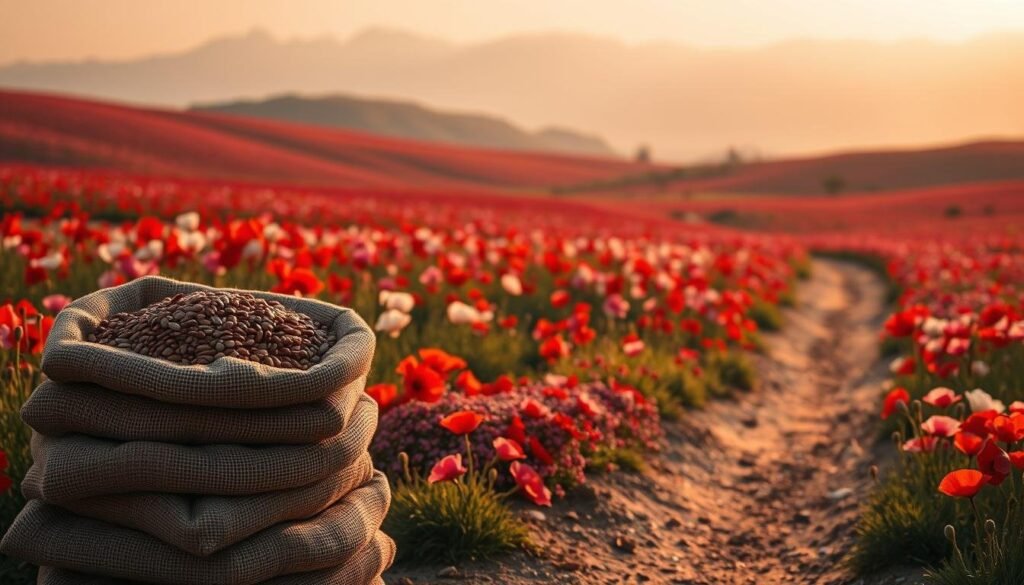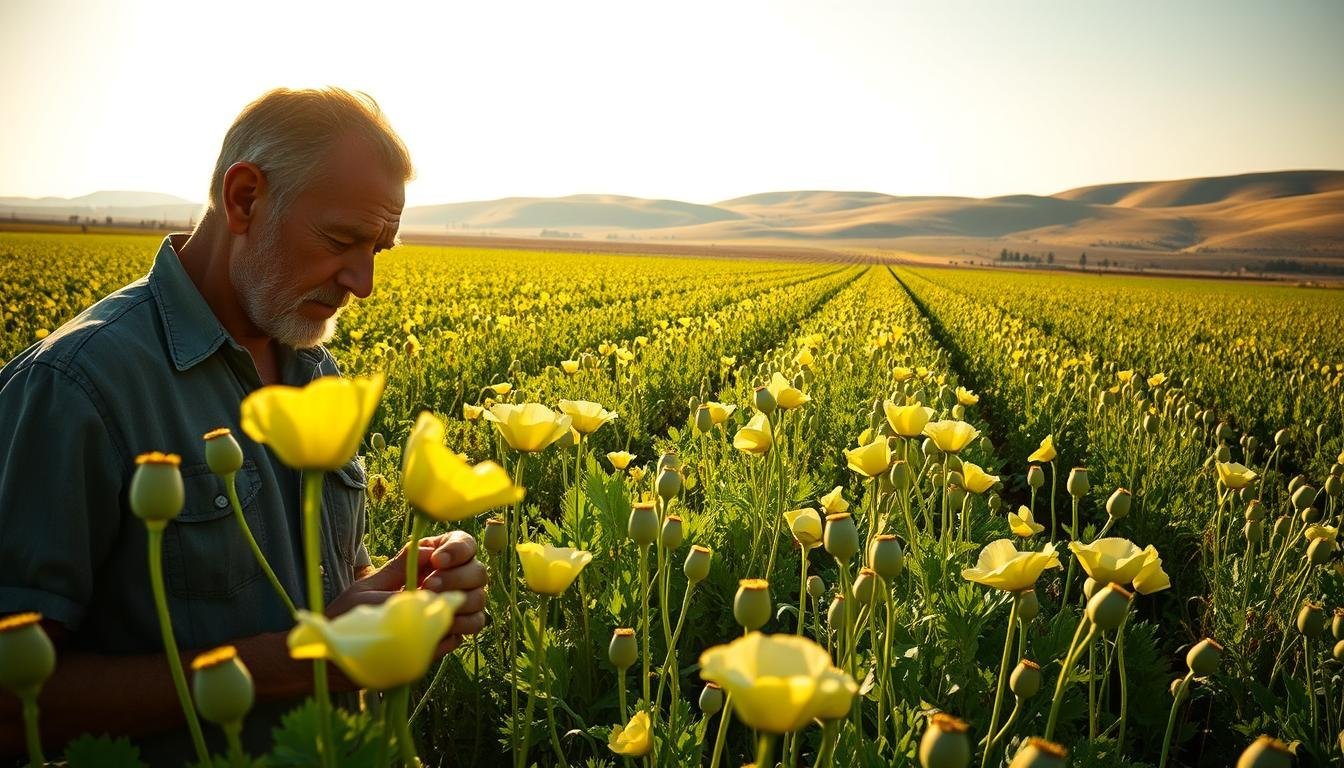Why is Poppy Seed Cultivation Banned in India? You might be surprised to learn that poppy seed cultivation is heavily regulated in India. The government has banned it, except for licensed farmers.
The ban on poppy seed cultivation comes from India’s history and laws on narcotics. The rules for growing poppies are strict. Yet, using poppy seeds in Indian food is a tradition that has lasted for a long time.
Exploring the poppy seed use in Indian cuisine and the laws around it is key. It helps us understand the complex legal landscape in India. This affects many people and businesses.
Contents
- 1 The Historical Significance of Poppy in India
- 2 Why is Poppy Seed Cultivation Banned in India?
- 3 Legal Framework Governing Poppy Cultivation in India
- 4 Licensed Cultivation: Exceptions to the Ban
- 5 Poppy Seed Use in Indian Cuisine Despite Restrictions
- 6 Economic and Social Impact of the Cultivation Ban
- 7 Conclusion: Why is Poppy Seed Cultivation Banned in India?
- 8 FAQ
- 8.1 Why is poppy seed cultivation banned in India?
- 8.2 What is the historical significance of poppy seeds in India?
- 8.3 What is the legal framework governing poppy cultivation in India?
- 8.4 Who is eligible for a license to cultivate poppy seeds?
- 8.5 How are poppy seeds used in Indian cuisine?
- 8.6 What is the economic impact of the ban on poppy seed cultivation?
- 8.7 Are there any exceptions to the ban on poppy seed cultivation?
- 8.8 How does India meet the demand for poppy seeds in Indian cuisine?
The Historical Significance of Poppy in India
In ancient India, poppy seeds were more than just food. They were seen as a symbol of fertility and wealth. People used them in rituals and ceremonies. Poppy seeds were also key in traditional medicine and spiritual practices.
The history of poppy seeds is deeply rooted in India’s culture. Knowing this history helps us understand the complex views on poppy seed cultivation today.
| Aspect | Significance |
|---|---|
| Culinary | Used in various traditional dishes |
| Medicinal | Used in traditional medicine for pain relief |
| Spiritual | Symbolized fertility and prosperity |
Poppy seeds played a big role in ancient India. They show how important poppy seeds were in Indian culture and history.
Why is Poppy Seed Cultivation Banned in India?
Many people wonder why poppy seed growing is banned in India. It’s mainly because of the country’s toughnarcotics control policies. The plant that poppy seeds come from, the opium poppy, can also make heroin and morphine. To stop poppy seeds from being used for bad things, India has strict rules for growing them.
Narcotics Control
India’s main reason for banning poppy seed growing is to control narcotics. The government has set up ways to watch and control poppy growing. These steps include:
- Strict licensing for poppy cultivation
- Regular monitoring of licensed cultivation areas
- Severe penalties for illicit poppy cultivation
The government works hard to make sure poppy seed growing doesn’t help the illegal drug trade. By controlling poppy seed growing, India stops the making of illegal drugs. This helps India follow international rules on narcotics.
Some important parts of poppy seed laws in India are:
- Rules for growing, processing, and trading poppy seeds
- Needs for licenses and permits for poppy growing
- Laws for exporting and importing poppy seeds
Learning about these laws helps us see how complex controlling narcotics is in India. It shows the important role poppy seed growing plays in this effort.
Legal Framework Governing Poppy Cultivation in India
The laws about growing poppy seeds in India are complex and strict. The main law is the Narcotic Drugs and Psychotropic Substances (NDPS) Act. It controls opium poppy growth, trade, and export.
The NDPS Act has strict rules. Licenses are mandatory for growing poppy seeds. These licenses are given by the Central Government. The rules aim to stop poppy seeds from being used illegally.
The law also has rules for watching and controlling poppy seed growth and trade. Agencies enforcing the NDPS Act work with police to stop law breaking.
| Regulatory Aspect | Description | Agency Responsible |
|---|---|---|
| Cultivation Licensing | Issuance of licenses for poppy cultivation | Central Government |
| Trade Regulation | Monitoring trade to prevent illicit diversion | State Governments & Customs |
| Export Controls | Regulation of poppy seed exports | Central Government & Customs |
It’s important to know these rules if you grow or trade poppy seeds in India. The laws help the economy but also fight against drug abuse.
Licensed Cultivation: Exceptions to the Ban
In India, you can grow poppy seeds with a license. The government has strict rules for this. It’s to make sure poppy seeds are used right, like in food or for export.
Farmers need to follow the government’s rules to get a license. These rules include careful monitoring and strict rules. Licensed cultivation is closely monitored, and farmers must follow all rules.
Licensing Process
The government gives licenses to farmers who meet the rules. Getting a license involves several steps. These include applying, verifying, and inspecting.
| Step | Description | Requirement |
|---|---|---|
| 1 | Application | Submit application with required documents |
| 2 | Verification | Government verification of application and documents |
| 3 | Inspection | On-site inspection by government officials |
After getting a license, farmers must keep following the rules. This includes reporting their work and letting officials inspect.
By sticking to these rules, licensed farmers help use poppy seeds properly in India. This supports food production and export.
Poppy Seed Use in Indian Cuisine Despite Restrictions
Poppy seeds are still a big part of Indian cooking, even with the rules. They are known as “khus khus” or “postak” in some places. These seeds bring a special flavor and texture that’s hard to find elsewhere.
In Indian cooking, poppy seeds are used in many ways. They are often ground into a paste to thicken curries and sauces. In sweets and baked goods, they add a nice crunch and a nutty taste. For example, “Makhan Bada,” a traditional Indian dessert, uses poppy seeds.
There’s a big demand for poppy seeds in Indian cooking. Even though growing them is banned at home, they are still brought in from other countries. This has made a big trade where poppy seeds are imported from places with less strict rules.
Culinary Significance of Poppy Seeds
Poppy seeds are more than just an extra ingredient; they are essential in many recipes. Here are some ways poppy seeds are used in Indian dishes:
| Dish | Use of Poppy Seeds | Region |
|---|---|---|
| Makhan Bada | Ground into a paste for flavor and texture | North India |
| Poppy Seed Chutney | Blended with spices for a tangy condiment | South India |
| Khus Khus Ki Sabzi | Used as a thickening agent in curry | East India |
The use of poppy seeds in Indian cooking shows we need a careful balance in rules about growing and trading them. There are good reasons for the rules, but poppy seeds are also very important in cooking.
Exploring Indian cuisine, you’ll see poppy seeds are a key ingredient. They make dishes richer and more interesting. Their continued use in cooking, even with rules, shows how important they are in Indian food culture.
Economic and Social Impact of the Cultivation Ban
Have you thought about how banning poppy seed cultivation affects the economy and society? The ban has caused big changes, especially for farmers who used to grow poppies.
The ban’s economic effects are wide-ranging. Farmers now have to grow different crops or find new jobs. This change has hurt their income and the local economy. Many farmers are finding it hard to keep their farms running.
| Impact Area | Pre-Ban Situation | Post-Ban Situation |
|---|---|---|
| Farmer Income | Dependent on poppy cultivation | Shift to alternative crops or livelihoods |
| Rural Economy | Supported by poppy cultivation | Affected by the decline in poppy cultivation |
| Agricultural Practices | Focused on poppy seeds | Diversification into other crops |
The social effects are also big. Communities that relied on poppy farming have had to adjust to new economic situations. This change has brought social challenges, like changes in community life and more joblessness.

In conclusion, banning poppy seed cultivation has deeply affected the economy and society. It’s important for policymakers to understand these impacts. They need to make smart decisions about farming and rules in the future.
Conclusion: Why is Poppy Seed Cultivation Banned in India?
You now know about the ban on poppy seed cultivation in India. This country has a long history of growing poppies. The ban is due to many reasons, like history, laws, and money.
The laws on poppy seeds affect farmers and people who eat them. Farmers depend on poppy seeds for work. People enjoy them in their food. India is trying to control narcotics, which makes poppy seed farming uncertain.
Finding a middle ground is key. Knowing about poppy seed farming and its rules helps us see the challenges. It shows how hard it is to make laws that work for everyone.
See Also: Why is Old Bay Seasoning Banned in Australia?
FAQ
Why is poppy seed cultivation banned in India?
Poppy seed cultivation is banned in India, except for licensed farmers. This is to control narcotics and stop poppy seeds from being used illegally.
What is the historical significance of poppy seeds in India?
Poppy seeds have been important in India for centuries. They were used in cooking, medicine, and for spiritual reasons. They symbolized fertility and prosperity.
What is the legal framework governing poppy cultivation in India?
The Narcotic Drugs and Psychotropic Substances (NDPS) Act controls narcotics, including opium poppy. It regulates the cultivation, trade, and export of poppy seeds.
Who is eligible for a license to cultivate poppy seeds?
Farmers who meet certain criteria and follow government guidelines can get a license. They can grow poppy seeds for food or export.
How are poppy seeds used in Indian cuisine?
Poppy seeds add flavor and texture to many Indian dishes. They are key in baked goods and desserts, making them a staple in Indian cooking.
What is the economic impact of the ban on poppy seed cultivation?
The ban on poppy seed cultivation has big economic effects. It hurts farmers and the rural economy. It also changes how farming is done.
Are there any exceptions to the ban on poppy seed cultivation?
Yes, licensed farmers can grow poppy seeds for food or export. They must follow strict rules and are closely monitored by the government.
How does India meet the demand for poppy seeds in Indian cuisine?
India imports poppy seeds to meet demand. This is because the ban limits the domestic supply.

Marcellus Stark is an investigative journalist from San Francisco, USA. He writes about global bans, rules, and unusual laws. He shares clear, interesting, and well-researched stories that help readers understand surprising facts worldwide.

